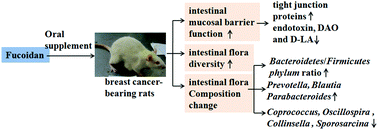The effect of fucoidan on intestinal flora and intestinal barrier function in rats with breast cancer
Abstract
Recent research studies have shown that the intestinal flora are related to the occurrence and progress of breast cancer. This study investigates the effect of fucoidan on intestinal flora and intestinal barrier function in rats with 7,12-dimethylbenz[a]anthracene (DMBA)-induced breast cancers. Sixty female Sprague-Dawley rats were randomly assigned to the control group, the model group, and the F1 and F2 groups, which were fed fucoidan at concentrations of 200 and 400 mg per kg bw (body weight), respectively. Intestinal histopathological analysis was performed and 16S rDNA high-throughput sequencing was used to provide an overview of the intestinal flora composition. The contents of D-lactic acid (D-LA), diamine oxidase (DAO) and endotoxin in plasma were detected by ELISA. Expression levels of the tight junction (TJ) proteins, phosphorylated p38 MAPK and ERK1/2 were measured using western blotting. Our results suggested that the intestinal wall of the model group was damaged. However, after fucoidan intervention, the villi were gradually restored. ELISA showed that the levels of plasma endotoxin, D-LA and DAO decreased in the F1 and F2 groups compared to those in the model group. Fucoidan treatment also increased the expressions of ZO-1, occludin, claudin-1 and claudin-8. Furthermore, the expression levels of phosphorylated p38 MAPK and ERK1/2 were upregulated in fucoidan treatment groups. The results of 16S rDNA high-throughput sequencing indicated that fucoidan increased the diversity of the intestinal microbiota and induced changes in microbial composition, with the increased Bacteroidetes/Firmicutes phylum ratio. In conclusion, the supplement of fucoidan could improve the fecal microbiota composition and repair the intestinal barrier function. The study suggested the use of fucoidan as an intestinal flora modulator for potential prevention of breast cancer.



 Please wait while we load your content...
Please wait while we load your content...